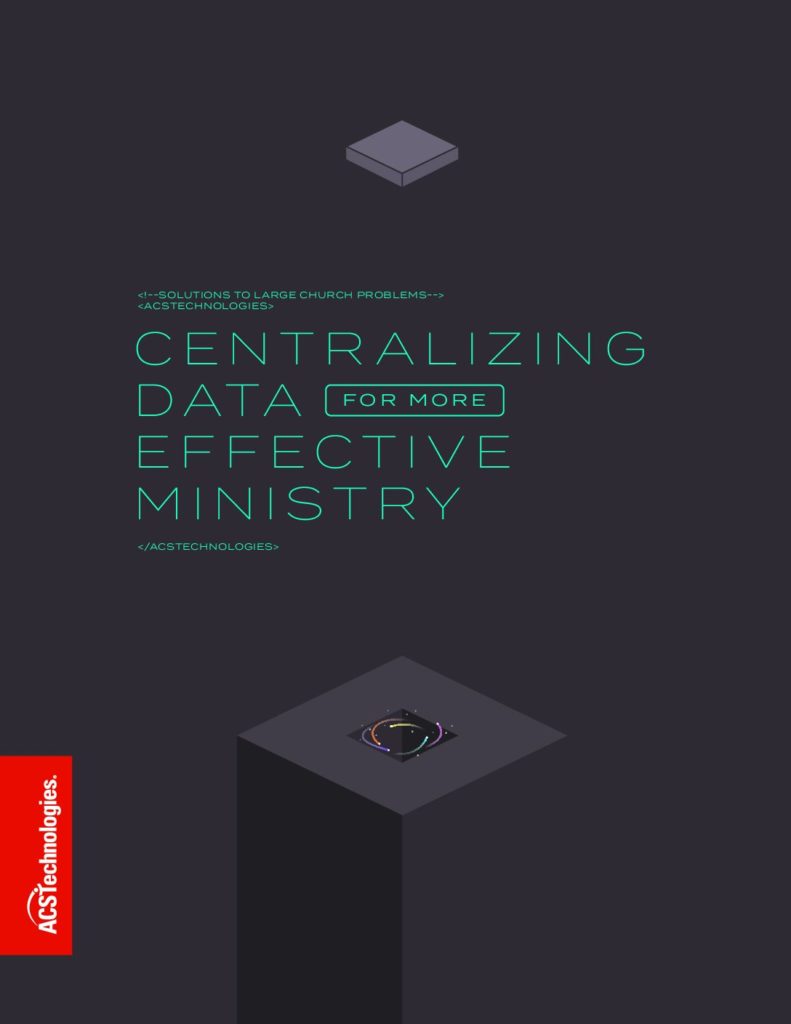Our brains prefer organization. Organization includes centralizing everything into one easy-to-use location. With so much data in your church, like names, contact info, registrations, and more, centralizing it is a path to efficiency. Do this well and you also eliminate other problems running rampant.
When data is scattered, disorganized, and cluttered, you miss opportunities to reach more people. No one should argue with that statement. Furthermore, trusted resource Centralizing Data for More Effective Ministry, brings even more motivation to the organization of data. Stating that by putting your information in one place it accelerates the pursuit of your church’s mission as it:
#1 Eliminates confusion.
No one should wonder where information is located. Wasting time chasing information means less time for high-priority work, like building relationships. Confusion is the enemy. Centralize your data and clarity reigns in your team.
#2 Eliminates rework.
When data is scattered, your team spends more time looking for information than they do using the information. As a result, they do the same thing multiple times just to get one result. Rework is one of the most expensive ways to run an organization.
#3 Eliminates headaches.
We all have limited time, energy, and attention. Wasting it on cumbersome data problems leaves less time for ministry impact. And eliminating headaches for your team creates a sense of relief. This relief gives the freedom and mental capacity to focus more on leading, relationships, and ministry opportunities.
Misunderstood
Data can be an overwhelming and misunderstood word. If you think of data as a tool . To be able to connect with people, it changes the perspective a bit. A tool chest has a lot of handy bits and pieces in it. So you can build and/or repair something. In your church, data is the information you need to be able to relate to. Minister with and shepherd a congregation. Sometimes you get an influx of data like at a stock the pantry and distribution community event. So many people and local stores may have provided the groceries and organized the goods to hand out and then served at the event.
You need to know who those people in your church are and how they rose to the occasion. The other side of that coin is that you want to be able to further connect with the community of people who arrived that day in need of groceries and compassion. Who are they? Where do they live? What physical and spiritual needs do they have? This information is critical to your next steps and continuous outreach to that targeted audience. If this data is not input with care and thought, it could get mixed up with another event or even worse. It could not make it into your system at all because you had no time to upload it before you launched another event. Sound familiar?
We can’t rely on our memory to organize connection points with people. We need a system in place to embrace the data and have a powerful tool in our toolboxes. It also means we have to prioritize how data is managed and maintained. If we do it right, we’ll focus our teams and accelerate our impact.
Conclusion
We’ll soon be sharing more about effectively centralizing our church data and keeping it secure. Until then I leave you with a quote from Henry Ford. “Coming together is a beginning, staying together is progress, and working together is success.” Here’s to our combined journey on how to best manage data from beginning to end. And therefore gain clarity, protect our budgets, and have a capacity to focus more on ministry opportunities.
Data should be a massive ministry asset, and it starts by centralizing everything into a single, current, easy-to-use system. This latest resource, Centralizing Data for More Effective Ministry along with the other guides in the Know and Grow: Solutions to Large Church Problems, show streamlined paths you and your team can follow. And, to make it even easier and so you don’t miss any of our Church Growth Resources, you can also receive our ministry blog posts straight to your inbox!
Steve serves as ACS Technologies’ Vice President of Data. He has been with the company since 1982 and started in the programming department. Steve has a degree in management science from the University of South Carolina and a master’s degree in Human Factors in Information Design from Bentley University.





